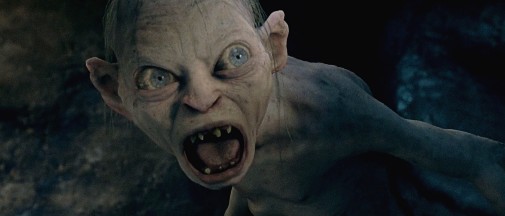
The particularities of screen acting make it a collaborative effort, even in the most low-fi of situations. What gets left on the cutting room floor, what reactions are chosen by the editor and director, the sound, the makeup, the way a cinematographer lights the performer's eyes, all shape what we see projected on-screen. Still, when it comes to awards, there's a belief that performance is the sole responsibility of the individual in front of the camera.
When the collaborative aspects of screen acting are made inescapable, it's difficult to collect golden accolades. We see that happening to voice-only performances and motion-capture efforts, in particular. With The Lord of the Rings trilogy new to streaming on Hulu, we have a good opportunity to explore the mo-cap performance that came closest to Oscar glory. I'm talking about the paradigm-shifting work of Andy Serkis as Sméagol/Gollum in 2002's The Lord of the Rings: The Two Towers…
Before analyzing the performance proper, here are some videos to watch and get an idea of what kind of work Serkis did on-set, how it translated to the final character and digital effect:
Gollum is a creation of many, maybe even more animation than strict motion-capture, but it's still built on the base of Andy Serkis' performance. His physicality defined Gollum's movements, his expression guided the creature's facial features, his voice made the character into a cinematic icon. In fairness, what Serkis achieved transcends Tolkien's prose, breathing visceral life into one of the author's most interesting creations. He's also in little more than 20 minutes of Peter Jackson's feature, a morsel of screen time lost amidst this three-hour epic. It's a testament to the force of Serkis that Gollum's presence is so memorable, so utterly defining of The Two Towers as a movie.
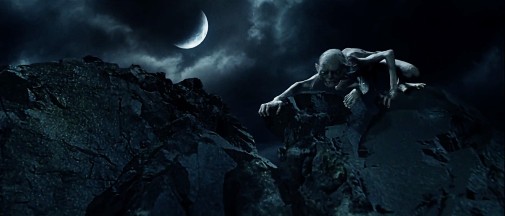
He enters the narrative with murderous intent, a cadaver-like wraith descending on a sleeping pair of Hobbits, Frodo and Sam. Sméagol was once a sort of Hobbit too, but countless years with the One Ring changed him, magic immortality forcing his being to persist far beyond the limits of sanity. His need for Sauron's golden band his white-hot, an incandescent sun of addiction that sucks the marrow from Sméagol, emaciating him into the fleshy ghost that is Gollum. It's a longing so powerful it poisons the mind, the soul, it wrecks the body with hunger and obsession, the posture and line of the skeleton crumbling into inhuman configurations.
Andy Serkis, an intense actor in his most subdued days, manages to play through the layers of computerized illusion, using his voice to delineate a ruinously deteriorating sense of self, a person degraded into an animal. The acting is far from subtle and therein lies its effectiveness. The actor's bilious vocalizations perturb, like a cat coughing up a hairball got crossed with the wails of a crying infant. Still, there's a technique to the way he transitions from a snarl to a piteous racket, equal parts brittle psychology and manipulative playacting.
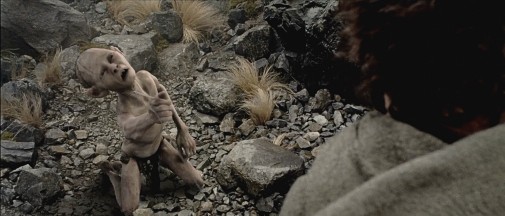
In his line readings, Serkis thus constructs a kaleidoscope of conflicting feelings and unnerving mutations, lulling us into a sense of disgusted distance, then he shatters it all with aplomb. He cuts our movie-watching stupor, our revulsed passivity, with razor-sharp despair, agony. The Ring's corroding influence makes this humanoid a slave to mystical malevolence, scratching at his phlegmy vocal cords as much as at his warped spirit. What first appears to be a rather annoying antagonist, slowly reveals himself as the picture's most tragic figure. It's to Serkis' credit that so much humanity fights off the character's grotesque design.

Gollum's self-abuse, his doomed corruption, is a gut-punch to the audience, a stab of decay that pollutes the fantasy with festering spiritual rot. Such things come to their unholy apotheosis during a famous Jekyll and Hyde routine that puts others to shame. Serkis' monologue, bifurcating into a dialogue, is the most performance-focused passage of the entire trilogy. Perhaps because of it, it's also one moment that wasn't directed by Jackson, but by Fran Walsh. In an externalized internal battle between a thieving monster and a guilt-ridden creature, the meek seems to rise above, if only for a moment. The way Sméagol's triumphant cries raise in volume, a celebration of deluded freedom at the end of his split-mind dialogue, is all Serkis and it's magnificent.
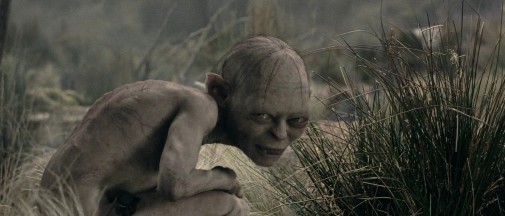
Sometimes, one does sees the seams of the computer-generated construction. During the traverse through the Dead Marshes, for instance, Gollum's face doesn't seem to fully obey the plasticity suggested by Serkis' speech. There's a waxen quality to the face, more akin to the dead-eyed monsters of Robert Zemeckis' mo-cap atrocities than anything produced by Peter Jackson before or since. Still, through all of that, Serkis' performance remains of constant quality, his demented mastery shining through the walls of CGI, cracking them open to let us glimpse at the void that's consumed this supernatural addict.
More than anything, Serkis is a great supporting player, complementing his costars' characterizations. Gollum is a black hole siphoning the life force of Frodo and Sam, a psychic wave that's carving away the rocky mountain of their resoluteness. Paranoia is born out of such ill auras, hate and cruelty spilling from the mental wounds caused by Gollum's prolonged company. Apart from Ian McKellen's splendid Gandalf, I'd point towards the trio of Elijah Wood, Sean Astin, and Andy Serkis as the acting MVPs of the trilogy, their dynamic as poisonous as it is riveting to observe.
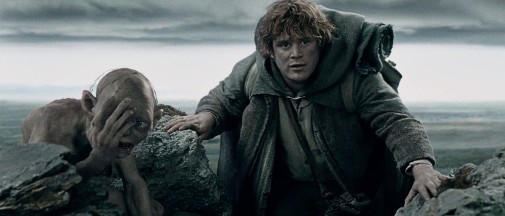
Musings on the merits and definitions of acting aside, how close did Serkis get to an Oscar nomination?
Reading up on press from the time, one gets the sense that this motion-capture work became something of a cause célèbre for pundits and cinephiles. Pressured by such acclaim and popular discourse, several groups saw fit to award Serkis as part of the ensemble or as a supporting actor contender. The BFCA, wanting to reward the actor but unprepared to challenge the paradigms of what film acting is, gave Serkis a special honor for Best Digital Performance. Nathaniel did nominate him in the regular Best Supporting Actor category at the Film Bitch Awards, though!

As for the BAFTAS, despite having nominated voice-only works before, chose to ignore Serkis, as did AMPAS. Considering the growing fame this lack of nomination has won over the years, one can surmise Serkis was very much in the conversation and might have conquered votes from more daring parts of the Academy. However, the old guard was still very much in charge then, before the many membership overalls of the past decade, making Serkis' Oscar bid a valiant lost cause.
Overall, 2002 was a year of snubs for AMPAS, with Dennis Quaid's stupendous turn in Far from Heaven being inexplicably left out of the final five. The Best Supporting Actor nominees of the 75th Academy Awards were Chris Cooper in Adaptation, Ed Harris in The Hours, Paul Newman in Road to Perdition, John C. Reilly in Chicago, and Christopher Walken in Catch Me If You Can. Cooper rightfully won, but I would have liked to have seen him compete against the beastly might of Serkis' Gollum.

Where do you stand on this matter? Do you think motion-capture and voice-only performances should be eligible for competitive acting Oscars?